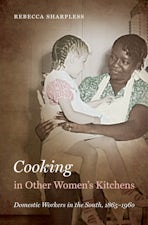Unprotected Labor
Household Workers, Politics, and Middle-Class Reform in New York, 1870-1940
By Vanessa H. May
262 pp., 6.125 x 9.125, 8 illus., notes, bibl., index
-
Paperback ISBN: 978-0-8078-7193-5
Published: June 2011 -
E-book EPUB ISBN: 978-0-8078-7790-6
Published: June 2011 -
E-book PDF ISBN: 979-8-8908-8501-2
Published: June 2011
Buy this Book
- Paperback $37.50
- E-Book $27.99
For Professors:
Free E-Exam Copies
May argues that working-class women sought to define the middle-class home as a workplace even as employers and reformers regarded the home as private space. The result was that labor reformers left domestic workers out of labor protections that covered other women workers in New York between the late nineteenth century and the New Deal. By recovering the history of domestic workers as activists in the debate over labor legislation, May challenges depictions of domestics as passive workers and reformers as selfless advocates of working women. Unprotected Labor illuminates how the domestic-service debate turned the middle-class home inside out, making private problems public and bringing concerns like labor conflict and government regulation into the middle-class home.
About the Author
Vanessa H. May is assistant professor of history at Seton Hall University in South Orange, New Jersey.
For more information about Vanessa H. May, visit
the
Author
Page.
Reviews
"[A] well-researched, well-written monograph. . . . Highly recommended.
Upper-division undergraduates and above."--Choice
"A convincing corrective."--Women's Review of Books
“May’s book is important even beyond its direct implications on household workers. . . . Especially relevant in an increasingly service-based and globalized economy”--Labor Studies Journal
"A tour de force of social history. By reading against the grain of her middle-class source base, May sheds light on the oft-neglected, day-to-day experiences of household workers. Meanwhile, she mounts a compelling and ambitious argument about their uniquely precarious location within the larger labor force, one with implications that extend far beyond the confines of New York City." --Journal of the Gilded Age and Progressive Era
"Unprotected Labor is one of those rare books that transforms how we think about a host of issues at the crossroads of women's history and labor history. Vanessa May has provided us with a superb account of the continual salience of 'public' and 'private' as discourse, space, and embodied experience. Class conflict in the home has found its scribe."--Eileen Boris, University of California, Santa Barbara
"Vanessa May vividly depicts the contradictions and ironies inherent in the relationships of domestic workers and the women who employed them. She explores the ways in which domestic workers resisted exploitation and the irony of middle-class women who fought for reform for industrial workers but not for the workers in their own homes. Their failure shows the importance of the public-private divide and the limitations of liberal reform."--Rebecca Sharpless, Texas Christian University, author of Cooking in Other Women's Kitchens: Domestic Workers in the South, 1865-1960



